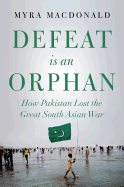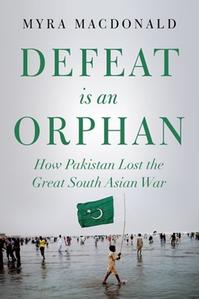
 In Defeat Is an Orphan: How Pakistan Lost the Great South Asian War, Myra MacDonald quickly covers the milestones of the Indo-Pakistani conflict, fought on and off since 1947, without lingering on episodes that have already been written about at length. (Readers curious about the conflict's inception would be advised to take a look at Nisid Hajari's Midnight's Furies for more information on the subject.) Instead, MacDonald focuses on the period from 1998--when India and Pakistan held nuclear tests--to the present day, putting an emphasis on the strategic missteps that allowed India to overtake Pakistan in the two countries' long, bitter rivalry.
In Defeat Is an Orphan: How Pakistan Lost the Great South Asian War, Myra MacDonald quickly covers the milestones of the Indo-Pakistani conflict, fought on and off since 1947, without lingering on episodes that have already been written about at length. (Readers curious about the conflict's inception would be advised to take a look at Nisid Hajari's Midnight's Furies for more information on the subject.) Instead, MacDonald focuses on the period from 1998--when India and Pakistan held nuclear tests--to the present day, putting an emphasis on the strategic missteps that allowed India to overtake Pakistan in the two countries' long, bitter rivalry.
Nuclear tests in 1998 were an ecstatic moment for Pakistan, promising strategic parity for the first time with its much larger neighbor. Emboldened by its newfound nuclear umbrella, however, Pakistan increased its sponsorship of militant groups, a policy that would eventually alienate the international community and undermine the country's domestic security. Pakistan had embraced proxy war as a viable strategy for decades in fighting India over the disputed border territories Jammu and Kashmir, and in fighting the Soviet Union and the Indian-backed Northern Alliance in Afghanistan. The United States, not yet grasping the threat of international terrorism, supported Pakistan as a valuable Cold War ally.
Over time, though, the Islamist groups that Pakistan encouraged became a dangerous liability. Furthermore, Pakistan's militarized society proved self-reinforcing, impeding the peace process with India and prompting destabilizing military coups. Indian interests, on the other hand, lay in improving relations with the international community (including a much warmer relationship with the U.S.) and in growing its economy. To some degree, MacDonald explains, the rivalry became one-sided: "India had no need to win a war against Pakistan--Pakistan was doing enough damage to itself to lose the competition with its bigger neighbour it had once hoped to win."
Defeat Is an Orphan has lessons for American readers. The U.S.'s various alliances with Pakistan come across as devil's bargains. The militant Islamist groups that both countries aided in fighting against the Soviet Union in Afghanistan would mutate into terrorist threats. The U.S. leaned heavily on Pakistan's support for its own invasion of Afghanistan, turning a blind eye to the Pakistani Inter-Services Intelligence's continued training and support for groups such as the Lashkar-e-Taiba, which carried out the horrific 2008 attacks on Mumbai.
MacDonald's history is primarily a work of argumentation, but it is supported by vivid, terrifying accounts of attacks carried out by Pakistan's proxies, including the 2001 attack on India's Parliament, the 1999 hijacking of Indian Airlines Flight IC-814 and the brutal internal actions of the Pakistani Taliban that led to deadly attacks on girls' schools and the shooting of Malala Yousafzai. According to MacDonald, Pakistan's ideological blindness and short-sighted strategies led to it "fighting a war it did not itself understand" and helping to inflict the current scourge of Islamist terrorism on the wider world and on itself. --Hank Stephenson, bookseller, Flyleaf Books
Shelf Talker: Myra MacDonald's Defeat Is an Orphan argues that Pakistan has lost its decades-long rivalry with India thanks in large part to its shortsighted embrace of militant Islamist groups.

